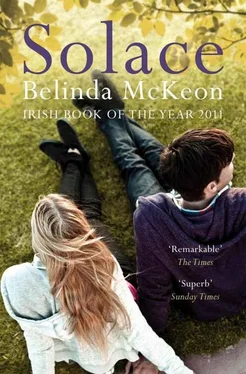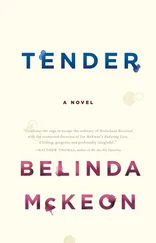Mark envied it in him, this ability to lock his thought down. His own attention was always darting, sputtering, untied. Reading, he would be four or five lines into a paragraph before he would think of something he wanted to see to, or listen to, or type into a search engine, and he would drift off on that thing, letting it tumble him into one new distraction after another until the clock demanded that he be somewhere, do something — and through that thing, in turn, he would almost sleepwalk his way. But his father’s concentration was absolute. On a machine or on a match, he could fix and settle like this. Until the job was done or the whistle blown, nothing could pull his gaze out of its walled path of awareness, out of its still, determined hub. The rhythm of his father’s hands was something Mark knew as intuitively as he knew the rhythm, even the feeling, of his own; and from where he stood, he could see exactly what remained to be done with the machine hitched to the back of the tractor, could see what way Tom would go about it, could tell where his glance fell, where his gaze fastened, where his mind pulled back for a moment, charting its next move. And yet if he was out there with him now, they would be arguing, already, over the best way to deal with the pins. Mark would be trying to do it more quickly; he could see the short cut from here. And his father would be telling him that he rushed everything, that he could stay with nothing, that he had no patience, no steadiness, no sense.
He lifted his phone and clicked his way back into the text Joanne had sent him while he was in the car with his mother. Was he feeling better, the message had asked. He had tried to text her back, but his mother had been talking to him, asking him questions about Mossy, and he hadn’t been able to think of anything to write; he had wanted his reply to be something funny, something wry, something that would cast him in a better light than the state she’d seen him in that morning. But his mother wasn’t talking in his ear now, and he still couldn’t think of the right thing to say. What was funny? What was wry? Should he ask her out now, or would that look like the action of a desperate fool? Should he tell her he was down home, or would it be presumptuous to think she was even interested in where he was? He stared at the message for another moment and then, snapping the phone shut, he left it on the dresser and went downstairs.
He was there now, and that was what mattered. Tom had waited for him all weekend, and Maura had given him stories about college work and scholarships and money that had to be applied for, and he had accepted it all, and he had started the work by himself on Saturday morning, mowing the first few meadows, getting the grass into rows, going through them with the tractor and the old Claas baler. It was a sight, too, to think of that baler as an old one: when Tom had bought it, only ten or twelve years ago, he had been the talk of the country, he knew he had, but now it was a rusting, unreliable heap of a thing, and the last few hours had been spent fixing it up after another ordeal driving around an uneven field. Now, though, he had it ready to go, for another while at least. The hardest fields, the fields that dipped too sharply and went too suddenly into bogland at the edges, he had left for Mark to do; he preferred Mark to do them. Tom himself would go around the meadow with a pitchfork, making sure the rows were even, watching the bales as they came.
The weather was promised good for another two days; then the rains would come from the north and stay heavy on their part of the map over the weekend at least. The summers were getting worse. Tom knew he was not imagining those summers years ago. They had been long and hot and sometimes desert dry, but there was no point in talking about those summers now. They were gone. Mention of them in Keogh’s of an evening drew only a silence that never seemed friendly. There were things nobody thanked you for reminding them of. There were years that had somehow slipped so far into the past that it was better not to mention them. People had been around then who were gone now, children had been small then, neighbours had been neighbours. Nobody around the place had been happier then, as far as Tom could remember it, but they acted now as though they had been happy in a way that they would never be happy again. It was best to leave it. People needed to have their ideas about what was gone; they needed them to hold on to.
For the week they would work together on the remaining fields, and then there would be the work of gathering the bales and of stacking them in the hayshed. There was other work, too, that Tom needed help with after the hay was saved; work he could do by himself, but that went more smoothly and more pleasurably with Mark at his side. He had been angry over the weekend, annoyed that Mark had not come down sooner, but he looked back on that anger now as though it had belonged to someone else. He checked the pins again and listened for the sound of the back door.
There had come two children, no more. It was enough and it was not enough; it seemed at once a blessing and a snub. All around them were families of four and six and even ten children, families crammed into cars and tearing around gardens; families too big, often, for the houses they were born into. But families that said what needed to be said about their fathers, that settled things into place for the years too far away yet to see. Tom and Maura had first a daughter and then a son. There had been only the beginnings of others. Two before Nuala, and another — late on, so late that it had been a shape, that Maura had taken to talking to it, even to naming it — around a year before Mark. And no more afterwards. Mark, the doctor had told Maura, was the last one there could be.
Nuala, to Tom, had been the same person all her life. She had seemed on her guard with him in the hospital when she was one day old, and she was still that way. The whole time she was small, all through her schooling years, then all her weekends home from college, she had been like that with him. Talking to him only in half-sentences. Giving him only half the story, and probably less than half the truth. Maura saw it in her too, said Nuala was secretive with her as well; said it was her age, but she said that about her no matter what that age happened to be. And in no time at all that age was almost the age Tom had been the year Nuala was born, and she was moving to London, coming home to see them only once or twice a year. She phoned often, and she and Maura had their chats, and on the phone to him she always told him a few things he liked hearing about her life over there, and asked how things were with him, but when she visited, he seemed never to have a conversation with her that lasted longer than their conversations on the phone. Always, she seemed only in the door with her suitcase — and now with her husband, a quiet English fellow called Denis — before she was heading off with the cases again, off to the airport, back to London.
The longest she had been home was for her wedding in the local church a mile from Dorvaragh. In the car that had talem them there, Tom had told her not to be nervous, and she had shown him how to fix the rose in his buttonhole. The air in the car had been struck with her perfume, and the skirt of her dress had spread out over almost the entire back seat, part of it resting, rustling, on his knee. The makeup she had worn made her skin look different, gave it a different colour and a new smoothness; her lips looked wet and glistening, and her eyelids were painted silver as a coin. All morning the house had been full of women bent down in front of mirrors, racing between the bedrooms and the sitting room with dresses and shoes and boxes in their arms. As the car pulled up to the church porch, Nuala had squeezed his hand once, and then she had opened the door for herself, before the driver could come around to her, and stepped outside. Tom had felt her shaking as he walked her up the aisle.
Читать дальше












